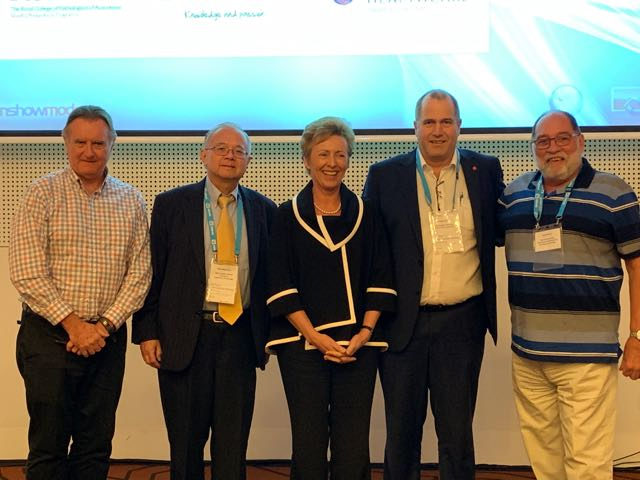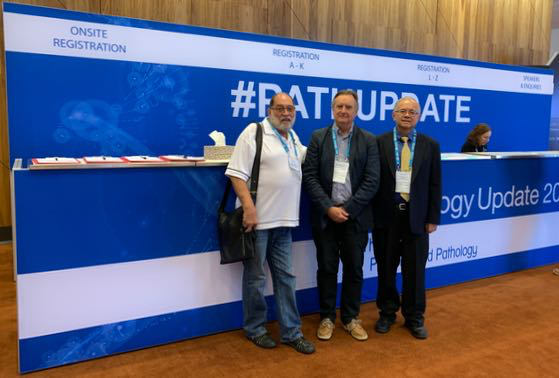Edouard Nice, Monash University, Australia and Mark Baker, Macquarie University, Australia
As part of the interaction between HUPO and the Royal College of Pathologists of Australasia (RCPA), especially in Education and Training, there was strong HUPO participation in the recent “Pathology Update: The Power of Personalized Pathology” conference held at the Melbourne Convention Centre from 22nd to 24th February 2019. This meeting was attended by over 1350 delegates, including medics, pathologists, scientists, trainees and healthcare workers, with strong industry support (over 30 companies at the trade exhibition).
Prof Dan Chan opened the meeting with the David Rothfield Memorial Oration with a talk entitled “The success of Precision Pathology: Multi-Omics Building Blocks”. He explained how advances in cancer pathobiology that have helped elucidate the intricate cell signalling mechanisms that trigger oncogenesis are due to the combined effect of genomic, transcriptomic, epigenetic and proteomic changes. He gave examples of how significant advances in molecular technologies, such as the multiplex-polymerase chain reaction (PCR), next generation sequencing (NGS) and mass spectrometry (MS), coupled with computational medicine, have identified new biomarkers for improving disease classification and diagnosis, including the recently reported CancerSEEK test, which uses a combination of assays for genetic alterations and protein biomarkers, and has the capacity not only to identify the presence of relatively early cancers but also to identify their localisation. Prof Chan also made other presentations at the meeting on “Tumour Markers in Practice” and Understanding immunoassay: a practical guide” as part of the Chemical Pathology agenda. In a complimentary plenary talk on the Saturday morning, Prof Eva Raik discussed ‘Precision Cancer Medicine – cup half full or cup half empty’ discussing both the advantages and hurdles that currently exist.
On Sunday 24th a whole session was devoted to “Clinical Proteomics: Development of a Pathology Partnership”. This session was organised by Profs Ed Nice, Mark Baker and Dan Chan for HUPO and Profs Peter Stewart and Andrea Horvath representing the RCPA. The session was chaired by Dan, and comprised four talks. Ed Nice led off with a talk entitled “Clinical proteomic biomarker discovery and translation for pathology”. This started with an introduction to HUPO and the new Pathology Pillar, and the requirement for a strong interaction with clinicians and pathologists as we enter the transitional phase of proteomics. He then outlined the role of faecal proteomics in GI tract pathology.
This was followed by a talk from Prof Horvath on “Evidence-based evaluation of proteomic biomarkers: from unmet medical needs to clinical application” in which she described proteomics as the Knight in Shining Armour. Using a hypothetical on acceptance of biomarkers that have better performance than current tests for coronary atherosclerosis, she introduced several recent proteomics examples from the literature. She stressed the importance of unmet clinical need and validation in successful translation. Dr Steven Ramsay gave a presentation on “Challenges of developing protein biomarker assays for clinical use - method validation and quality issues” further illustrating the importance of this issue, using IGF1 as an example.
To close the session, Prof Peter Stewart, former president of the RCPA, acting as devils advocate, with a concept like the “glass half full or half empty concept introduced earlier in the meeting, discussed the “Barriers to adoption of Proteomics in clinical diagnosis”. He highlighted areas such as the complexity of the technology, measurement errors, throughput, skill base in technology and informatics and the need to up-skill pathologists (the goal of the HUPO-RACP collaboration), clinical utility and the cost and reimbursement rates.
All the slides that were presented in this session are currently available on line at https://www.rcpa.edu.au/Events/Pathology-Update/Post-Conference. Further joint HUPO/RACP sessions to further advance education and training are being planned for 2020.

Clinical Proteomics: Development of a Pathology Partnership.
From left to right: Prof Peter Stewart, Prof Dan Chan
Prof Rita Horvath, Dr Steven Ramsey, Prof Ed Nice

Pathology Update: The Power of Personalized Pathology
From left to right: Prof Ed Nice, Prof Peter Stewart, Prof Dan Chan


.png)